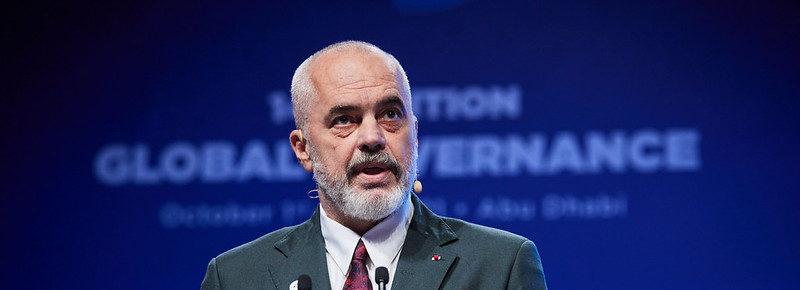Prime Minister Edi Rama has declared that Albanians are Europeans and want to be part of the European Union as he spoke about the Iranian cyber attack against Albania, the desire for EU membership and other issues in an interview with Susanne Koebl and Walter Mayr of the well-known German newspaper « Der Spiegel ».
In the interview, Rama underlined that cyber attack’s goal was to destroy Albania’s entire system of digital services.
Meanwhile, he was asked about the situation with Russia and reiterated that Serbia cannot sanction it. Regarding the issue of Kosovo, Rama says that Serbia should recognize it, but Aleksandar Vucic cannot do it.
Part of the interview below:
DER SPIEGEL: Mr. Prime Minister, Albania severed diplomatic relations with Iran a few days ago. The diplomats had only 24 hours to leave the country. What is behind this?
Edi Rama: Iran attacked our country with a massive cyber attack. The goal was to destroy all the digital government services that we have built so hard over many years. Thanks to our IT specialists, experts from Microsoft and the US government, we were able to reduce the damage.
DER SPIEGEL: The background to the attack is, apparently, the presence of several thousand members of the Iranian opposition, who are actively working for regime change in Iran and cooperating with the US, the so-called People’s Mujahideen (MEK). In 2013, your country accepted the MEK from Iraq at the request of Washington. Would you prefer to leave this group today?
Edi Rama: No, Albania has a proud tradition of sheltering people in danger. And our strategic alliance with the US cannot simply mean that Washington always has our support. Sometimes we have to help the USA too. Albanians owe a lot to the Americans.
DER SPIEGEL: The war in Ukraine has changed the world and s now threatening the fragile peace in the Western Balkans. How deep is this divide?
Edi Rama: Very deep. More than 80 percent of Serbs think positively of how Putin is currently opposing the West, but in Albania his popularity is less than one percent. This is the result of a survey conducted by our government, immediately after the start of the war. Moscow’s influence in Serbia is storng, in the Serbian part of Bosnia-Herzegovina it is even very strong. Russia has a lot of influence on the Serbs. We must be aware that this influence can turn into something terrible.
DER SPIEGEL: What should we be prepared for?
Edi Rama: Putin would be happy if there was a conflict somewhere in the Balkans. The head of the Kremlin bullies and provokes wherever he can. In his speeches, Putin constantly refers to Kosovo, the most painful of the unresolved problems in the Balkans. We must at all costs prevent something bad from happening.
DER SPIEGEL: What do you advise?
Edi Rama: You can’t ask for much from Belgrade now. Everything can be turned upside down. Serbia, for exeample, cannot sanction Russia.
DER SPIEGEL: Putin likes to use the history of Kosovo as a template for the occupation of Crimea, Donetsk and Luhansk. Does he have the facts that NATO bombed Belgrade and invaded Kosovo without a UN mandate?
Edi Rama: The only reason there was no mandate was that Russia and China voted against it. The annexation of Crimea follows an imperialist model, like the attack on Ukraine, a sovereign and democratic country. The bombing of Belgrade and the liberation of Kosovo at that time, on the other hand, served the purpose of saving the population from ethnic cleansing. And the International Court of Justice finally confirmed Kosovo’s independence as an act of international law.
DER SPIEGEL: Has anything really changed in the Western Balkans in the last twenty years?
Edi Rama; The Balkans have always been a tense region, it is fragile. But I contend that the situation is better today than at any other time.
DER SPIEGEL: How can this be determined?
Edi Rama: Despite the differences, the six heads of government of the Western Balkans have agreed since a meeting in Berlin in 2014 that we must turn the tide of history together. It takes small steps to build a larger relationship, just as the Germans and French slowly moved toward complete peace after World War II.
DER SPIEGEL: Does this also apply to your relationship with Serbian President Aleksandar Vučić?
Edi Rama: Absolutelu. The history of Albanians and Serbs is a history of pain and blood. But when I was elected prime minister, I decided to go to Belgrade. My visit in 2014 was the first of an Albanian head of government to Serbia after 68 years. And then Vučić came to Tirana. This shows how far we have come.
DER SPIEGEL: Is there any hope for an agreement on the Kosovo issue.
Edi Rama: Regarding Kosovo, we agreed that we would disagree. I think that Serbia should recognize Kosovo. But Aleksandar Vučić cannot do that. But, at least we can talk about this topic. And we cooperate in projects like the Open Balkans.
DER SPIEGEL: A kind of mini-Schenghen between North Macedonia, Albania and Serbia?
Edi Rama: Yes, where all other Balkan countries are also invited. Vučić has thus accepted the border between Albania and Kosovo. A big step forward and a really big political achievement.
Read the article on the Albanian Daily News
https://albaniandailynews.com/news/iranian-cyber-attacked-aimed-at-ruining-albania-s-digital-services-rama

